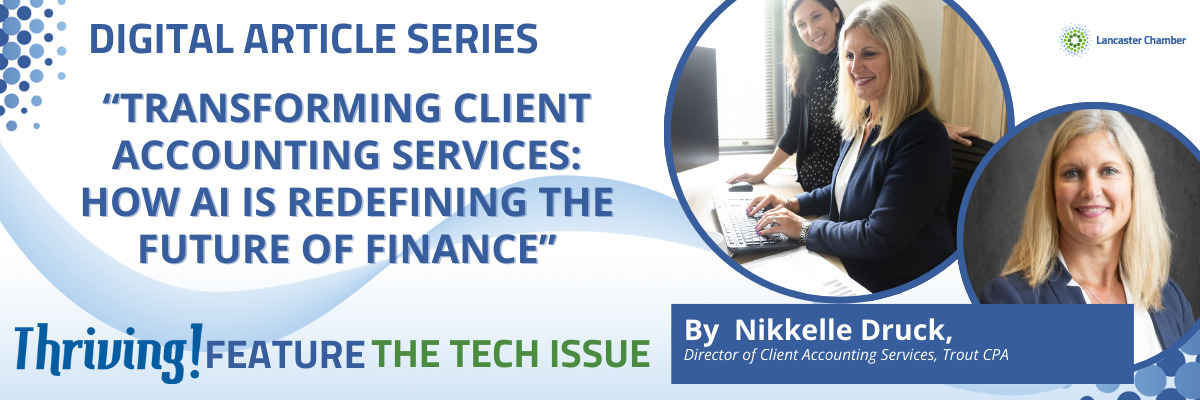by Nikkelle Druck, Director of Client Accounting Services, Trout CPA
A feature piece from our Fall 2024 TECH issue of the Lancaster Thriving Publication.
In the rapidly evolving technology landscape, artificial intelligence (AI) has emerged as a transformative force, redefining industries across the globe. The idea that “AI is the future” is repeated so often now that it’s become a default view rather than a profound insight.
What does it mean to say “AI is the future” as an accounting firm? In this article, we highlight the use of AI in client accounting services (CAS), which focuses on transactional accounting and controller services. How will this technological advancement impact the long-standing processes in accounting and reshape the professionals within CAS? As we stand at the forefront of this shift, we can begin to see the truly far-reaching potential.
Traditionally, transactional accounting has been synonymous with time-consuming data entry, exhaustive reconciliations, chaotic expense management, and reactive decision-making. Accounting professionals spend countless hours meticulously inputting financial information from various sources into accounting systems. Reconciliation processes require matching transactions across multiple ledgers and bank statements, a puzzle that is not only time-intensive but also prone to human error. Expense management often involves sifting through numerous receipts and invoices to ensure compliance with budgets and company policies. These valuable efforts culminate in producing financial reports that hold the key insights needed for the talented professionals in CAS to inform and advise their clients on business performance and strategy.
These time-intensive manual processes result in CAS professionals spending an immense amount of time analyzing prior periods – be it the previous month, the last quarter, or the previous year – to create accurate representations of financial activity. This focus on history naturally leads to reactive decision-making uncovering trends and problems too late for timely intervention. By the time issues are discovered, they may have compounded, requiring more time and resources to resolve. Businesses miss the opportunity to address problems in real time, which can affect cash flow management and financial accuracy.
By leveraging AI, machine learning, and other advanced technologies, the turnaround time from raw, unverified financial data to organized, informative presentations can be greatly reduced. At Trout CPA, we’ve already seen considerable improvements utilizing these technologies with our technology partners to streamline accounting processes for our clients. Intelligent AP platforms using ocular character recognition and machine learning can pull information from electronic invoices to automate the data entry and the coding of expenses. Accounting systems with AI-fueled features can intelligently match transactions between ledgers and bank account activity to automate month end reconciliations and reveal discrepancies. Advanced analytics can uncover patterns and predict future outcomes with remarkable accuracy. These automation gains pave the way for a future where financial reports and dashboards are available in real-time, enabling businesses to turn insights into action.
Consider the implications: accounting advisors can now provide forecasts and scenario analyses that help clients make informed decisions about investments, cost management, and growth strategies. Predictive analytics allows advisors to anticipate market shifts and prepare accordingly, ensuring their clients are always one step ahead. This proactive approach not only enhances decision-making but also positions CAS professionals as invaluable partners in their clients’ success.
As AI enhanced technology ushers in a new era of accounting, the profession is poised to shed its reactive past and embrace a proactive future. The ability to automate financial data flows and provide real-time insights transforms the role of CAS professionals from historical analysts to forward-thinking strategists. This shift enables them to offer more value to their clients, guiding them with timely advice and helping them navigate the complexities of the financial landscape. Armed with the tools and information needed to drive proactive decision making, the era of reactive accounting is ending, and a new, proactive chapter begins.
not secure

